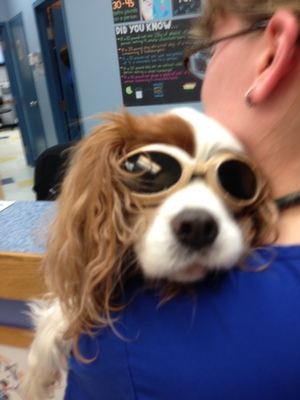
Xylitol is a “natural” sweetener that appears to sweeten much the same way as sugar-but with 75% fewer carbohydrates & 40% fewer calories. It is actually a sugar alcohol & in nature is found in mushrooms, lettuce, plums, berries and some other hardwood trees & fruits. Therefore it’s no surprise this product is showing up very many different foods & other products in our homes. these products vary but include chewing gum, mouthwashes, toothpaste, baking products, breath fresheners, nasal sprays including the more commonly available candy & mints. Please be clear-xylitol is safe in people.
Our concern at Sunnyview Animal Care-your Halifax, Bedford, Dartmouth, Lower Sackville, and Fall River veterinarians-is that xylitol is estimated to be 100 times as toxic as chocolate to dogs, and is very toxic to cats. There is no test for its presence in your pet, and toxic effects in a pet can be rapid. The prognosis is good however with early intervention.
Symptoms of Xylitol Poisoning:
A) Vomiting
B) Weakness
C) In-coordination or difficulty walking or standing/walking like they are drunk
D) Depression or lethargy
E Tremors or Seizures
Xylitol Toxicity in Cats
In cats, a very small amount of xylitol can elicit a sudden release of insulin resulting in low blood sugar-a condition known as hypoglycemia. Even if your pet is able to survive exposure, liver failure is sadly common. It is extremely toxic.
If you suspect that your cat has ingested a product containing xylitol – This condition can lead to seizures & a coma-therefore prompt veterinary attention is needed on an emergency basis with no exceptions.
Xylitol Toxicity in Dogs
Like we outlined in the discussion regarding cats, xylitol is also extremely toxic to dogs. Small amounts of xylitol result in low blood sugar levels, seizures, liver failure and can progress to your pet’s passing.
For example; as few as two pieces of gum can lead to hypoglycaemia in a 20kg (44b), while the liver toxic dose with many brands of gum can result from the ingestion of only nine(9) pieces/ or sticks in a 45 pound dog.
Please do not induce vomiting or give anything orally, a your dog or cat unless specifically directed to do so by our veterinarians or those at the emergency clinic.
In summary, please keep xylitol containing products where your pets cannot get to them, and if your cat or dog does eat something you suspect contain xylitol we do recommend you obtain our services or those of the Metro Animal Emergency Clinic(MAEC) in Burnside immediately.
Our Practice Number is 902-835-2223, the Metro Animal Emergency phone number is 902-468-0674.
How is Xylitol Poisoning Treated?
Fast & aggressive treatment by our veterinarians are essential to effectively reverse the toxic effects of xylitol, & prevent the development of severe problems. You can expect your pet the placed on IV fluids, bloodwork for a general outline of your pet’s overall health situation, and specifically the blood glucose level, possibly the induction of vomiting to prevent further xylitol absorption.
You can expect your dog or cat will require extended hospitalization & blood sugar monitoring for 24-48 hours, the administration of liver protectant, and possibly even the supplementation of potassium as this electrolyte can be affected in addition to everything else outlined above in these cases.
You can also expect a follow-up appointment with a repetition of liver enzyme-related blood work to ensure no long-term damage has occurred. This is especially important if the animal is over the age of eight years whether the dog or a cat.
While the overall toxicity of xylitol in other species is not well documented at the time of this writing, there is some concern that other non-primate species such as ferrets, hamsters & guinea pigs etc. may also react to xylitol in a similar manner to that in dogs & cats.
Related Tags – Submitted with respect from Dr. Jeff Goodall, Sunnyview Animal Care in Bedford, Nova Scotia, Halifax Veterinarian, Lower Sackville Veterinarian, Fall River Veterinarian, using various Veterinary Reviewed Source materials. Alcohol, antidote, liver failure, glucose, ingested poison, poison, poisons, gum toxicity, chewing gum toxicity, gum, chewing gum, gum poisoning, chewing gum toxicity, mouthwash toxicity, mouthwash, baking product toxicity, chocolate toxicity, chocolate poisoning, sugar substitute poisoning, sugar substitute toxicity, sugar-free gum, sugar-free gum toxicity, sugar-free chewing gum poisoning, sugar-free chewing gum toxicity, toothpaste toxicity, toothpaste poisoning, poisoning treatments, veterinary poisoning treatments, dog vomiting, cat vomiting, vomiting, seizures, dog seizures, Seizures, veterinary treatment
Sunnyview Animal Care
36 Duke Street, Unit#6
Bedford, Nova Scotia B4A 2Z5
Phone: (902)835-2223 Fax:(902)835-8837
sunnyviewvet@eastlink.ca / www.sunnyview.vet



